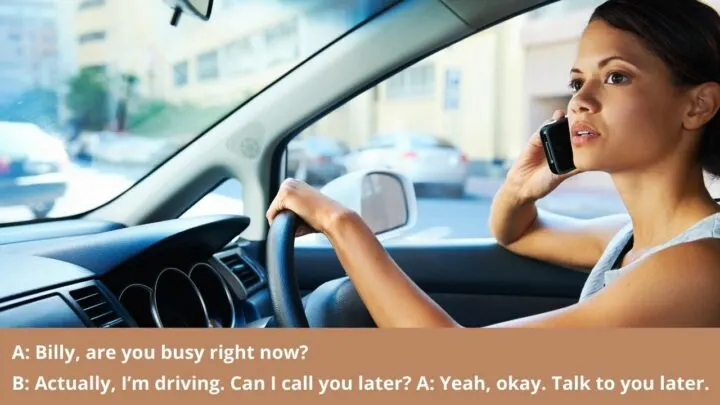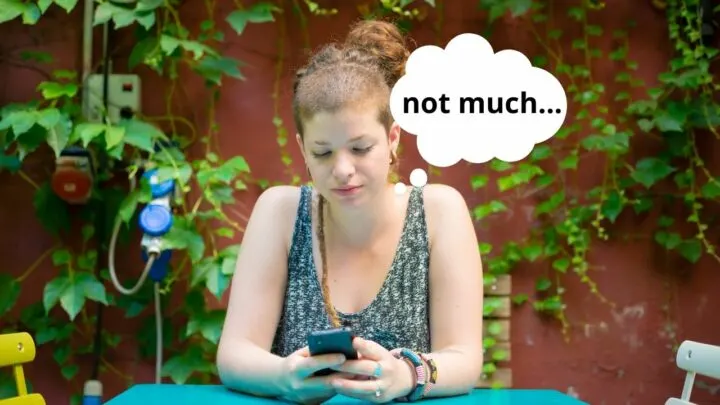You’ve just received an email from your friend whom you haven’t seen for quite some time asking “What are you up to?”
How should you respond? And, what exactly does the question mean?
Would you say that you’re a little busy? Or, would you respond by saying “nothing much really?”
If so, how do you think the conversation would go afterward? All you need to do is scroll down to the bottom of this page to have a full grasp.
What does “what are you up to” mean?
The question “what are you up to” literally means “what are you doing.” But, more often than not, it either implies that the sender of the message wants to catch up or needs to ask a little favor from you. It is used in casual discussions between or among people with intimate relationships, as opposed to formal ones. If you’re not busy and you’re “up to” hanging out or talking with the sender, you can say “nothing much” and maybe ask a follow-up question right away. But if your gut tells you not to, then you can indirectly decline by saying “I’m sorry, but I’m a little busy right now.”
“What are you up to?” in ample detail
Humans are social beings which means we need to relate and interact with others as often as daily.
This is the reason why we have people who we consider as friends or peers whether at school, at work, or somewhere else.
These people tend to tap on us every once in a while to check for updates or share stories: the good, the bad, and especially the most nonsensical ones.
If you know some as described, and yet, you still keep talking with them, then you’ve got the most genuine people around you, so please take care of them.
This is why the question “what are you up to” matters, at least generally speaking.
Now, let’s dive a couple of miles deeper to understand its meaning, function, and usage in English.
The context in which to use “What are you up to?”
As mentioned, if you receive this expression via any direct messaging app, or hear it when someone calls, that person is simply asking whether you’re busy or not.
Therefore, it can also be translated into “what’s keeping you busy at the moment” or simply “what are you doing right now.”
Your interpretation is context-dependent, which is why this expression is not that suitable in formalistic situations because of its ambiguity.
So, as the message receiver, you can use your social acuity to interpret the underlying implication of the message.
This means that if the sender of the message is someone you consider as a “good” friend, then it usually just means the way it is.
But, if you suddenly get this from someone who isn’t that close to your heart or from a sales agent, I’d understand if you’re going to say you’re “quite busy.”
And, now let’s discuss the function or purpose of this expression.
The Function of “What are you up to?”
What purpose does using this question in conversations serve? Is it really just to ask if someone was busy? Or does it go beyond that?
Well, the answer to this can only be accurately interpreted within the language user’s mental framework.
Sometimes, it can be used as an innocent remark to get someone to mention the condition they are in, such as whether they are busy or not.
But other times, it can also be used as a precursory question to an upcoming favor or request.
Of course, being able to know the real intent is dependent on the overall context involved, particularly the relationship with the sender.
So, again, our natural wit would let us determine what the real message is, as long as we are keen enough at the time of delivery.
The Level of Formality of “What are you up to?”
At the beginning of this post, it was mentioned that your friend sent you an email asking “what are you up to.”
Would that suggest that you can also send this kind of email message to your superiors, clients, and professors whenever you want?
Well, you can freely do that, of course. But apparently, you should not expect any response from them, unless they really are that friendly.
This is because “what are you up to” is an informal expression that is supposed to be used between or among intimately-related individuals.
So, this would come across as awkward or even a bit offensive when used as mentioned, a phenomenon called “register clash.”
Register clash is only effective when and if the intention is to inject humor during conversations, and hence, the necessary caution.
Variations of “What are you up to?”

And now, let’s go over some variations of this expression that you can easily use in colloquial or informal English.
Unless you’re talking with someone intimately close, the following phrases are not applicable in the formal setting such as in business correspondence.
Whatcha up to?
You might have heard of “whatcha up to” in movies or other forms of natural conversation among native speakers of English.
This expression is a good way to start a conversation with your friend that you want to catch up with.
For example, you can call your friend right after his or her office hours and ask this question.
A: Hello, Sam! Whatcha up to?
B: I just got out of the office. I’m starving. Wanna grab some dinner?
As you can observe, the direct interaction between the interlocutors suggests that they are relatively close to each other rather than just acquaintances.
Whatup today?
Similarly, we can also use “whatup today” if we want to make some plans for activities with a friend within the day.
A client or business acquaintance may not be very impressed when you say this to them, but a bored friend will.
A: Hey, Sarah! Whatup today?
B: Nothing on the list really. Got any plans?
In the example response above, the question response is suggestive of the openness to commit to an activity.
What’s up?
Lastly, we can also make use of “what’s up,” which is probably the most-popularly used phrase because of its briefness and simplicity.
“What’s up” can be conveniently used when you bump into a friend unexpectedly in the same venue.
Or, it can be used as the simplest greeting upon arriving at a party or gathering.
The message receiver is not necessarily obliged to answer the question at length, as it may also be used as a replacement for “hello” or “hi.”
A: Hey! Calvin, Walter, Paul, what’s up?
B: Nah. Just hanging out. Go grab yourself a beer.
Other ways to say or synonyms of “What are you up to?”
In English, there isn’t only one prescriptive way to structure how we express our greetings, just like most languages.
The next couple of examples are related to “what are you up to” in the sense that they can be used as initial greeting lines either in spoken or written conversations.
How’s everything going?

“How’s everything going” is a little less direct than “what are you up to.”
The former usually prompts a shorter response, perhaps with a positive, neutral, or negative connotation such as “fine,” “not bad,” or “terrible.”
A: How’s everything going?
B: Things are great. Thanks.
The mood of the message receiver will also give some signs whether he or she wants to keep the conversation going.
If so, a follow-up question will likely be heard, as well as an introduction of a topic to talk about.
What are you doing?

A more straightforward synonym for “what are you up to” is “what are you doing,” which has a much clearer meaning.
If a person asks this question, he or she simply wants to know what activity you are engaged in at the time of asking the question.
A: Hello, Fiona. What are you doing?
B: I’m waiting for the laundry to get done. And you?
However, this question may also be used rhetorically wherein the user is not really asking for the activity, but rather wants to rebuke or reprimand someone doing something wrong or awkward.
This could happen, for instance, when your sibling suddenly hugs you for no reason.
A: (suddenly hugs B)
B: Eeww! What are you doing? Get off me!
Are you busy right now?

Finally, the most honest equivalent to “what are you up to” is most likely “are you busy right now.”
The most practical implication of the expression being discussed is to know whether the intended receiver is available for a chat, and that’s it.
Obviously enough, we can interpret it however we want.
But, if we don’t want to get stressed about it, we can always go back to this meaning as a default process.
A: Billy, are you busy right now?
B: Actually, I’m driving. Can I call you later? A: Yeah, okay. Talk to you later.
How to respond to “What are you up to?”

Although the basic meaning of “what are you up to” is “what are you doing,” you can’t just respond by stating whatever action you’re doing at the exact moment you receive the message.
That means you can’t just say “I’m standing,” “I’m sitting, or “I’m eating.” But, “I’m driving” is an exception of course.
I mean, yes, you may say those things, but just bear in mind that such literal responses are sarcastic, which is quite rude rather than humorous when done out of context.
And, rudeness may lead to aggression, so this simply isn’t the best kind of response to give in most scenarios.
If you think you’re busy and you can’t talk, or perhaps you just don’t want to talk, then simply say “I’m a bit busy at the moment” to kill the conversation.
But, if you’re interested in having a discourse, then you can open up the discussion by saying “not much” and then asking a follow-up question.
Again, the response is essentially based on the context, rather than any standardized language rules.
“What have you been up to?” vs. “What are you up to?”
Another question that this post wants to address is related to the grammatical difference between “what have you been up to” and “what are you up to.”
The main difference lies in the tenses used, in which the first is in the present perfect, and the second is in the simple present tense.
The timeline of the present perfect can be simplified into the meaning of “from before until now,” whereas the simple present into “always.”
However, the first question is more context-dependent rather than the second structure.
If someone asks you using the present perfect tense, the person is interested in hearing your life events in the relatively recent past.
A: Is that you, Brandon?! It’s been forever, man. What have you been up to these days?
B: I just got married last year, and we’re having a baby soon.
The time being referred to could mean “today,” “these days,” “these past few weeks,” or “these past few months,” depending on the last time you’ve interacted with the speaker.
Whereas, the question “what are you up to” suggests more of an inquiry to the receiver’s plan of activities “at the moment,” “within the same day,” or even “a couple of days later.”
A: Hey, George! I feel kind of bored. What are you up to?
B: Nothing much, too. Come over here. Let’s play ping-pong.
Put simply, the former question simply aims to prompt a general update, but the second expression’s goal is to inquire whether one is available at the time of speaking.
Frequently Asked Questions on “What are You Up To?”
How can we answer “what are you up to?”
We can simply answer it by stating the activity we are doing at the time of asking the question like “I’m driving.” Or, we can even respond with our location “I’m just at home,” which implies that one is not busy and is available for an activity.
What does “what are you up to today” mean?
“What are you up to today” means “what are your plans today.” Thus, it is often interpreted as an implicit invitation to do something for the day.
Should it be “what are you up ‘to’ or ‘too’?”
“Too” is an adverb and “to” is a preposition. The question requires a preposition, rather than an adverb, to complete the phrasal verb “to be up to” which means “to be doing” something.
Conclusion
We use language to indicate meaningful utterances, prompt the hearer to do something, or create a certain effect on the message receiver.
The question “what are you up to” can be interpreted in several ways depending on the context of the conversation.
With these, we can, therefore, deduce that a statement is not always as innocent as it seems, thereby highlighting the role of pragmatics in language use.

Hey fellow Linguaholics! It’s me, Marcel. I am the proud owner of linguaholic.com. Languages have always been my passion and I have studied Linguistics, Computational Linguistics and Sinology at the University of Zurich. It is my utmost pleasure to share with all of you guys what I know about languages and linguistics in general.

